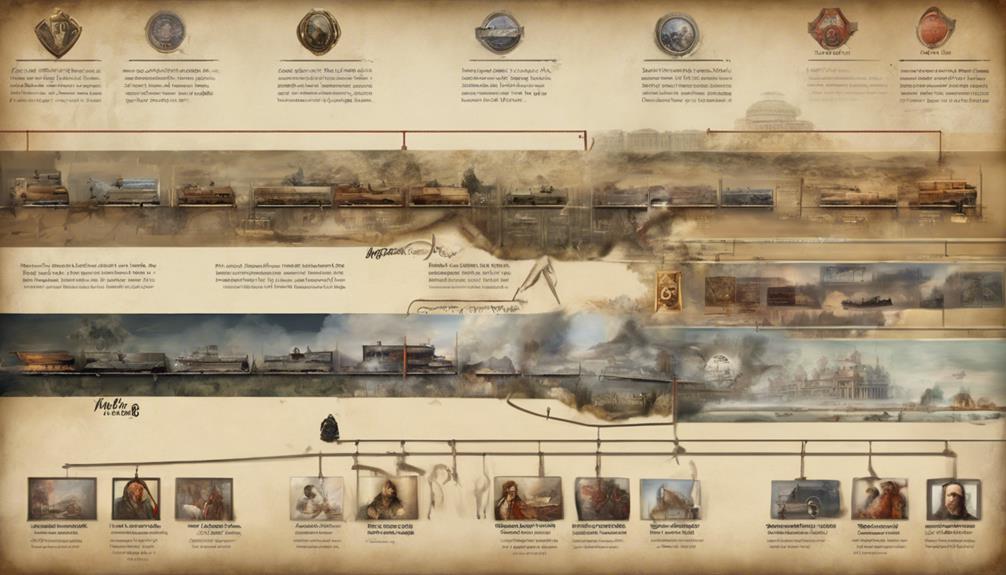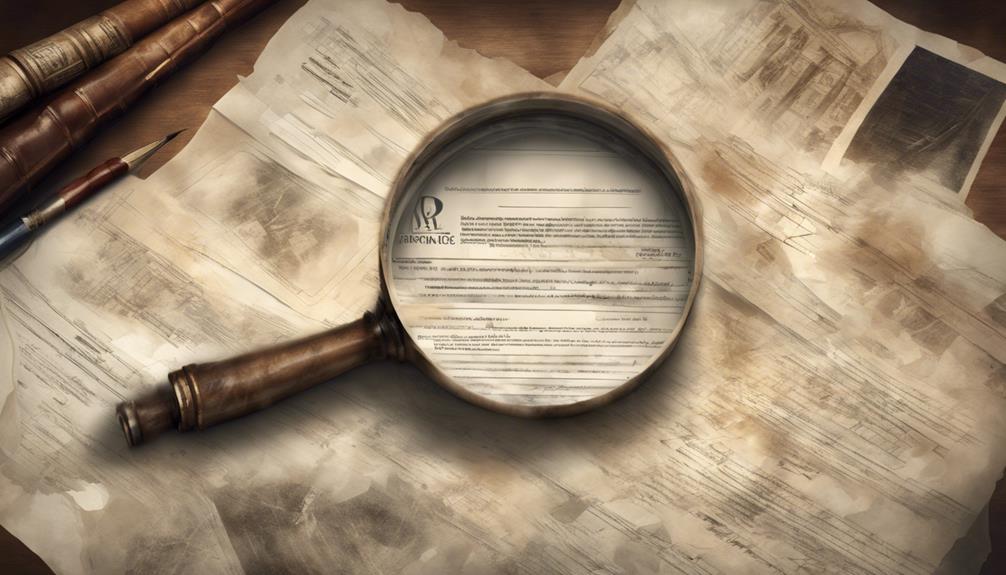Companies typically conduct background checks within the past 7 to 10 years, focusing on factors like criminal history and financial stability. This timeframe is commonly seen in pre-employment screenings, ensuring a balance between recent information and privacy rights. Understanding legal requirements and regulations is vital for compliance with federal laws and industry standards that govern background checks. Adherence to these rules is necessary for proper handling of sensitive information and for protecting the rights of job applicants. The timeframe reflects the importance of relevant data while respecting individuals' privacy.
Key Takeaways
- Background checks typically cover the last 7 to 10 years.
- Timeframes are determined by federal laws and industry requirements.
- Different types of background checks have specific lookback periods.
- Companies adhere to legal regulations for accurate and compliant screenings.
- Understanding time limits is crucial for informed hiring decisions.
Background Check Timeframes

Employers typically review candidates' background information within the past 7 to 10 years for criminal and financial records. This timeframe is a common practice in pre-employment background checks to assess an individual's criminal history and financial stability. The lookback period guarantees that recent relevant information is considered while balancing the candidate's right to privacy.
Various factors influence the background check process's time limits, including federal and state laws, industry standards, and specific job requirements. For instance, some positions may necessitate a more extensive lookback period due to security concerns or regulatory compliance requirements. Additionally, the Fair Credit Reporting Act (FCRA) imposes limits on the time frame for conducting background checks to promote accuracy and fairness in hiring practices.
States like California and New York have specific regulations dictating how far back criminal history can be reported, often capping it at 7 years. Employers must navigate these legal requirements and ensure adherence with FCRA regulations to conduct thorough yet lawful background checks.
Legal Requirements and Regulations
Federal and state laws, along with industry regulations, dictate the specific timeframes for conducting background checks to guarantee compliance and fairness in the hiring process. One crucial federal law that governs background checks is the Fair Credit Reporting Act (FCRA), which mandates obtaining written consent from the applicant before initiating the background check process. The lookback periods for background checks can vary depending on the type of check being conducted and the position being filled. For instance, criminal history checks typically go back 7 to 10 years, while credit reports and employment verification may have different timeframes for information retrieval. Understanding these legal requirements and regulations is essential for companies to ensure they conduct background checks within the permissible time limits and remain in compliance with relevant laws.
| Aspects of Background Checks | Timeframes | Regulations |
|---|---|---|
| Criminal History | 7 to 10 years | Varies based on federal and state laws |
| Credit Reports | Varies | Regulated by the Fair Credit Reporting Act (FCRA) |
| Employment Verification | Specific to each case | Governed by federal and state regulations |
Process and Information Handling

During the background check process, companies typically verify information such as criminal records, employment history, education, and credit reports within a specific timeframe. Employers must adhere to federal laws such as the Fair Credit Reporting Act (FCRA) when handling background check information.
The FCRA sets limits on how far back companies can look into an individual's credit history and other background details. While the standard timeframe for background checks is usually the last 7 to 10 years, certain industries or positions may require deeper scrutiny into an individual's past.
Understanding the legal regulations and limitations is essential for employers to ensure compliance and make well-informed hiring decisions. Proper handling of sensitive information is paramount during background checks to protect the privacy and rights of job applicants.
Specific Checks and Verifications
When conducting background checks, companies typically focus on specific checks and verifications to assess a candidate's qualifications thoroughly. These checks include employment background checks, criminal background checks, credit history checks, and verification of education and professional credentials.
Each type of check has a designated lookback period, with criminal history checks typically going back 7 to 10 years and credit history checks focusing on the past 7 years.
State and federal laws govern background screenings, imposing legal requirements and restrictions on what information can be collected and considered during the hiring process. Employers use these verifications for various purposes, such as confirming a candidate's suitability for a position, validating their qualifications, and ensuring they meet the necessary criteria for the role.
Understanding the specific components and purposes of these background checks is essential for making informed hiring decisions and complying with legal regulations to foster a fair and transparent recruitment process.
Time Limits and Reporting

Companies follow specific time limits and reporting regulations when conducting background checks on potential candidates. Under the Fair Credit Reporting Act (FCRA), certain information like bankruptcies, tax liens, collection accounts, civil suits, judgments, and negative records may not be reportable after the past seven years. However, exceptions to the 7-year rule can be made, especially for high-salary job positions where older information might be considered relevant.
It is vital for companies to understand the laws governing background check reporting at the federal and state levels to ensure conformity. For instance, bankruptcies are typically not reportable after 10 years, and tax liens may not be reported after 7 years post-payment.
Frequently Asked Questions
How Far Do Most Jobs Go Back on Background Checks?
Most jobs typically go back 7-10 years on background checks. The timeframe may vary based on the position, industry, and legal requirements. Different checks, like criminal history and credit reports, have specific lookback periods.
Will a Felony Show up on a Background Check After 10 Years in Texas?
A felony may show up on a background check after 10 years in Texas if it is relevant to the job. State law does not specify a time limit for reporting felony convictions, allowing employers to take into account older convictions based on job requirements.
What Is a Red Flag on a Background Check?
A red flag on a background check could be a criminal conviction, discrepancies in employment history, or negative credit report. Employers may scrutinize unexplained gaps, inconsistencies, or fraudulent qualifications to make informed hiring decisions.
What Background Check Do Most Employers Use?
Most employers use background checks that cover the last 7-10 years of a candidate's history. These checks typically include criminal history, employment verification, and education checks. Understanding this process helps employers assess candidates effectively.
What is the standard timeline for background checks for employees in companies?
RaceTrac employee background checks typically follow a standard timeline of 1-5 business days. This includes verification of employment history, criminal records, and education credentials. The process may vary depending on the position and location, but RaceTrac aims to complete background checks efficiently to ensure a safe and reliable workforce.
Conclusion
To sum up, companies typically conduct background checks within the past seven years, but some may go even further back depending on the industry and position.
Just like peeling back layers of an onion, these checks reveal hidden truths about a candidate's past.
It's essential for businesses to follow legal requirements and regulations to guarantee a thorough and fair evaluation of potential employees.
Remember, a clean background is like a blank canvas – full of potential and promise.









